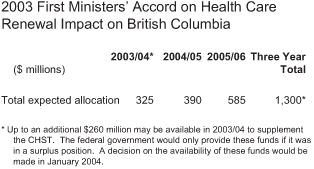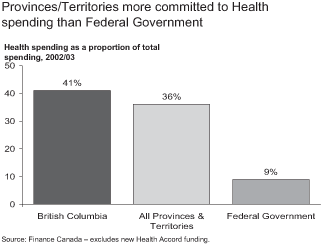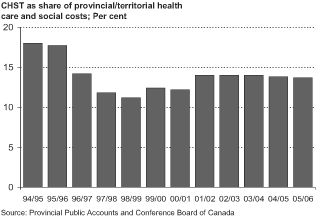Health Care Renewal in British Columbia
Existing 2002/03 Service Plans for the Ministries
of Health Services and Health Planning have been tabled.
These two service plans are based on the existing health
budget without reference to increased federal funding that
the province will receive under the First Ministers' Accord
on Health Care Renewal announced on February 5, 2003. BritisháColumbia
expects to receive new federal funding of $1.3á billion
over the next three years as indicated in the table below,
and is committing that every dollar of new federal funding
will go toward health care — toward building a more
sustainable, affordable and effective health system. Once
government has assessed how to use the new funding, a revised
service plan and supplementary estimates for the Ministries
of Health Services and Health Planning will be presented
to the Legislature.

British Columbia is doing its share to improve patient
care and control health care costs
British Columbia's health care costs have grown significantly
faster than the rate of the economy over the past decade,
and now account for 41áperácent of provincial government
spending. British Columbia has added $1.1ábillion to health
care spending, a 12áperácent increase, in the past year
alone. Clearly, these unsustainable increases are not the
answer to protecting and improving health care over the
long term. Thatĺs why BritisháColumbia has begun an ambitious
and wide-ranging health reform strategy, which includes:
- Reducing the number of health authorities from 52 to
6, and establishing new performance agreements with them
to ensure accountability for patient outcomes while allowing
for flexibility in service delivery;
- Creating a network of health services to provide British
Columbians access to a range of acute care services, including
emergency services, within a standard time frame;
- Better serving the needs of people who are seriously
ill, including those with chronic or terminal illnesses,
so they can live independently, with dignity and with
the highest quality of life possible;
- Providing incentives to increase access to full service,
primary health care, particularly in rural areas;
- Putting a greater focus on health promotion and illness
prevention, so British Columbians have access to the tools
and information they need to become partners in their
own health and well-being; and
- Working with other provinces to control drug costs through
measures such as a common drug review process.

Federal funding share declining
By contrast, federal support to health care and other social
programs has long been declining, and the provinces have
been forced to assume a much higher percentage of total
health spending. Since medicare was implemented, the federal
share of over-all health spending has decreased from 50áperácent
to just 14áperácent.
These federal shortfalls have become acute in the past
decade. Since 1994, the provinces' annual health and social
spending has increased by $32.5ábillion. In that same time,
the Canada Health and Social Transfer to provinces has increased
by less than $0.5 billion.
British Columbiaĺs position on new federal funding
for health
The chart shows that the small increases to Canada Health
and Social Transfer (CHST) in the late-1990s did not go
nearly far enough in restoring federal funding to health
care. The province is concerned that even these small gains
will be lost without new and sustained federal action. That
is why the province has been urging the federal government
to make a significant commitment to health care and bring
the CHST back up to the 1994/95 level of 18áperácent of
provincial health care costs.
As the provincial budget goes to print, the impact of the
2003 First Ministers' Accord on Health Care Renewal has
yet to be fully determined. The new federal funding announced
in the Accord is expected to support innovations and sustainability.
Without Federal transfer increases, a fairer
Federal
share of health care costs cannot be achieved

The $1.3ábillion British Columbia expects to receive will
be used:
- To sustain existing plans to build a better health system;
- To continue the reforms in the areas of primary care,
home care and catastrophic drug coverage; and
- To ensure appropriate levels of diagnostic and medical
equipment, training and services.
Over the coming weeks, the Health ministries will be updating
their service plans to reflect the direction and additional
resources made available through the Accord.
|
